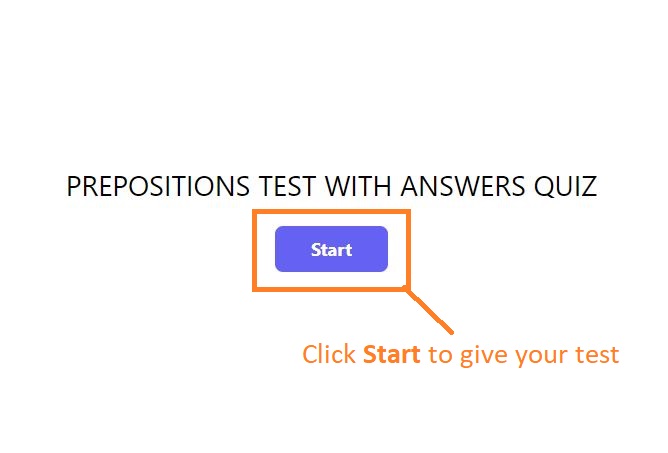The Prepositions MCQ Test with Answers is an engaging quiz designed to test your understanding of prepositions in English grammar. It consists of 20 multiple-choice questions that challenge you to select the correct missing preposition in each sentence. You will give here 20 Prepositions Test With Answers quiz.
Whether you’re a student aiming to master grammar or someone keen on refining languages kills, this quiz provides an opportunity to reinforce your preposition knowledge in diverse contexts.
Prepositions Test With Answers exam
You can participate these prepositions test and rate yourself about preposition. You will help you to grow your grammatical skills. Here are a few sample questions from the quiz:
FAQ’s on prepositions quiz
Here are some unique FAQs about prepositions that might come in handy for anyone preparing for a test or just looking to understand them better:
What is the purpose of prepositions in a sentence?
Prepositions are used to show relationships between nouns or pronouns and other words in a sentence. They indicate direction, location, time, manner, and other relationships. For example, in the sentence “The book is on the table,” the preposition “on” shows the relationship between “book” and “table.”
How can I distinguish between “in,” “on,” and “at” when referring to time?
- “In” is used for longer periods such as months, years, centuries, and long periods (e.g., “in September,” “in 2024,” “in the 19th century”).
- “On” is used for specific days and dates (e.g., “on Monday,” “on September 1st,” “on my birthday”).
- “At” is used for precise times or specific points (e.g., “at 5 PM,” “at noon,” “at midnight”).
Why is it important to understand prepositional phrases?
Prepositional phrases act as adjectives or adverbs in sentences, providing additional information about nouns or verbs. Understanding them helps clarify the meaning of sentences and improves your ability to construct complex and detailed expressions. For instance, in “She walked to the store with her dog,” the phrase “to the store” tells us where she walked, and “with her dog” adds more detail about her company.
Can prepositions be used at the end of sentences?
Yes, prepositions can be used at the end of sentences, especially in informal speech and writing. For example, “What are you talking about?” is a common and acceptable usage. However, in more formal writing, it might be preferred to rephrase the sentence to avoid ending with a preposition, like “About what are you talking?”
Are there any prepositional phrases that can have multiple meanings?
Yes, some prepositional phrases can be ambiguous depending on context. For instance, “in the bank” could mean “inside the building of a bank” or “inside the bank’s accounts (like financial resources).” Context usually helps determine the correct interpretation.
How do prepositions differ from adverbs?
Prepositions and adverbs both describe relationships and can modify verbs, adjectives, or other adverbs, but they function differently.
Prepositions always require an object (e.g., “in the room,” “on the table”), while adverbs do not (e.g., “She ran quickly,” “He spoke loudly”). Adverbs modify the verb directly, whereas prepositions relate the verb to a noun or pronoun.
What are some common mistakes to avoid with prepositions?
Common mistakes include:
- Using incorrect prepositions, like saying “interested on” instead of “interested in.”
- Overusing prepositions in sentences can lead to redundancy (e.g., “The meeting was held in at the conference room”).
- Confusing similar prepositions, such as “between” and “among” (e.g., “among the two options” should be “between the two options”).
How can I improve my understanding and use of prepositions?
Practice is key. Read a variety of texts and pay attention to how prepositions are used. Do exercises and quizzes to test your knowledge. Additionally, using language learning apps and seeking feedback from teachers or peers can also help reinforce correct usage.
Are there any prepositions that are used exclusively in idiomatic expressions?
Yes, some prepositions are often used in idiomatic expressions and might not follow standard rules. For example, “on edge” means “nervous,” and “under the weather” means “ill.” Understanding these idiomatic uses requires familiarity with the expressions and their contexts.
Can prepositions change meaning based on their context?
Absolutely. Prepositions can change meaning depending on their context. For example, “over” can mean “above” (e.g., “The picture is over the fireplace”) or “more than” (e.g., “over 50 people attended”). Context helps determine the specific meaning intended.
You will give another English Grammar test to improve your skills
Article Exercise With Answers (A, An, The) Quiz

